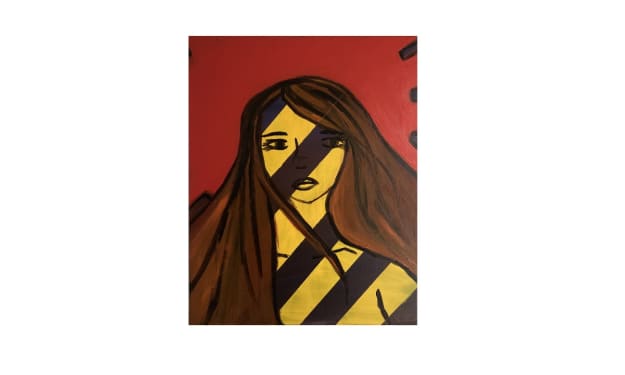Normalize "No"
"You should not play when you're injured."

I am not an athlete. I do not have pressure from entire countries and endorsements on my shoulders. I do not have the eyes of history boring into my back. I have no idea what it is like for people in such positions. However, what we've been seeing unfold this year, and frankly, for decades, is that at least in the United States (and I imagine this is the case in many other places), we have a mentality that forces people into uncomfortable and dangerous situations where the individual feels either too powerless, or too full of shame, to say, "No. I can't/won't do it."
I find this attitude extremely odd. From a mainstream cultural standpoint, we've seen our attitudes shift from a more community-based mindset to a more individualistic mindset. I once dated someone who always said, "I only look out for number one," meaning themselves. Yes, you should look out for yourself, but for some reason the insistence that looking out for yourself and looking out for others are mutually exclusive disgusted me.
While I was never a dancer on an elite scale, like many children, I was signed-up to do ballet. My father thought it would teach me to be more graceful. However, what nobody knew at the time was that I have certain deformities in my feet and joints that make it inevitable that I will either trip over a flat surface, or, twist or sprain my ankles. My teacher would look over my foot after a really bad twist, and tell me that I need to ice it until a guardian arrived to take me to the doctor. "You don't play injured," she said, "It will only make the injury worse."
Sure, that phrase is a cliché. But it's also the truth. If you are sick or injured, continuing to push yourself makes you more likely to make things worse, or even incur other injuries.
Here's another cliché. I was taking equestrian lessons at the insistence of my father. One day, when I was very young, my horse freaked out and I was thrown from his back. I don't remember much, except for waking up in the hospital. I was not ten years old yet when my father told me as I came to, that "You know what they say. You've got to get back on that horse." Except the horse, Buddy? I couldn't get back on him. He had thrown a shoe, but the stables ignored his injury, which ended up causing the incident where I was thrown from his back doing a simple trot. The pain was too much for him. Had the child version of myself known that Buddy was in pain, I would have never mounted him in the first place. Not for my sake, but for his.
The fate of an injured horse is rarely a happy one. At least, not back then.
Anyway, there have been several times in my life where I simply felt like I could not go on. I was ill or injured, be it physically or mentally, and my body and my mind were telling me "don't play if you're injured." Or, as flight attendants put it, "Put your mask on yourself before you assist others." Put these two things together, and this is the attitude we should aspire to when we're dealing with everyone. Yes, we must not create an environment where someone must continually put themselves in peril due to pressure from a group, and we must also cultivate an attitude that allows individuals to speak up for themselves in order to preserve their safety, body, and mental wellness.
Yes, look out for yourself. Please. Secure your mask before assisting others. But don't take "look out for yourself" as, "Secure your mask and let everyone else figure it out on their own." We keep making the mistake of thinking that it's okay to put pressure on an individual for the glory of a group, while paradoxically thinking that ourselves, as individuals, are more important than anyone else.
We have seen this play out in our country's history time and time again. American football is a great example. Boxing is a great example. We put pressure on these people, who often experience critical injuries and even brain damage. But, we think it's okay to keep these players on the field or in the ring because it entertains us, us being a city, a region, or a country. Yet, we must always look out for "number one?" This is hypocrisy.
There are decades worth of NFL players and boxers who acquired CTE. I imagine there are countless others that I'm unaware of in high-impact sports, such as rugby, hockey, and soccer. Dave Duerson, Mike Webster, Kerri Strug, Simone Biles, Naomi Osaka, Serena Williams, and numerous others, are valued for not who they are as actual people, but how they represent the group. So when they succumb to injuries, don't perform at their all-time best, or recognize their mental or physical injuries, they receive hate and derision. This does not make sense. They are people, and not case studies. They are not anomalies. They are individuals who represent the hypocritical rule we've placed on people to always perform, never quit, and for darn sure, don't take care of yourself - unless it means glory in a sport. The same thing goes when a professional singer has an off-night. Or an actor has to swallow their pain or injury to make sure they have enough dailies for the DOP and editors to sift through.
What makes things worse is that we heap praise onto the people who perform injured (sports, arts, and otherwise) and call it "brave." It is brave. But you know what is more brave? Admitting that you're not willing to put your life at risk for accolades. Knowing that using your voice or your decision to not perform for everyone else's glory and entertainment is going to put you under an even more intense amount of scrutiny than before.
Speaking up in such a way, also, sends the message to others that it is okay to do the same. It gives people examples of the kind of courage saying, "No" or "I can't" or "I won't" takes. Everyone I've named in this story has received criticism and hate. This includes Buddy, the horse.
When you take this out of the context of competitive sports, or performing arts, even regular social pressure has this strange hypocrisy happening. Months ago, I injured my right foot, and I am barely getting close to halfway through physical therapy. My own doctor would not sign off on any paperwork to allow me to work from home, instead of driving a long, very bumpy commute to work. This is a first world example, of course. I have a job that merely requires a computer and internet. Yet, despite showing up to the office visibly shaken, crying, and vomiting from the pain of the commute in the parking lot once I was able to strap my CAM walker boot back on to get to my desk, I still had to have a note, from a doctor who insisted I was fine, in order to stop injuring myself. (If you're curious, I got a second opinion and a note. My feet are heavily bandaged to prevent further injury while I recover. Both feet are strategically bandaged because the deformities that make me prone to these injuries exist in both feet)
Or, when I was contemplating ending a long relationship, I got an angry response from a close friend, calling me a "quitter." Even my boss at the time told me, "Well, he doesn't beat you and he's not an alcoholic, so how bad can it really be?" The attitude we place on athletes and performers is not only in their realm, everyone. It exists in every part of our American culture (and I cannot speak to other cultures, but I imagine similar/worse things are happening elsewhere) that we cannot simply quit or stop or say "no" when we, as individuals, KNOW that we can't keep going on, playing injured. Trying to push through mental health issues so we don't lose jobs, friendships, loved ones...
What I'm trying to say is, this hypocritical illness is systemic. It is rooted deep in our culture, and if you pause and think about the people in the spotlight who receive the most hate, you'll start to realize that there are other racist, classist, sexist, ableist, and other factors playing into who receives the most hate - and the most pressure.
We can do better than this. We are better than this. Let's start with ourselves, and then once we have our metaphorical "respect" masks secure, reach out and assist others to help them out, too. The plane is going down at this rate, folks. We need to help ourselves, and each other.
About the Creator
Mimi Sonner
Just another liberal arts degree holder looking for career fulfillment in all the wrong places.
Enjoyed the story? Support the Creator.
Subscribe for free to receive all their stories in your feed. You could also pledge your support or give them a one-off tip, letting them know you appreciate their work.






Comments
There are no comments for this story
Be the first to respond and start the conversation.